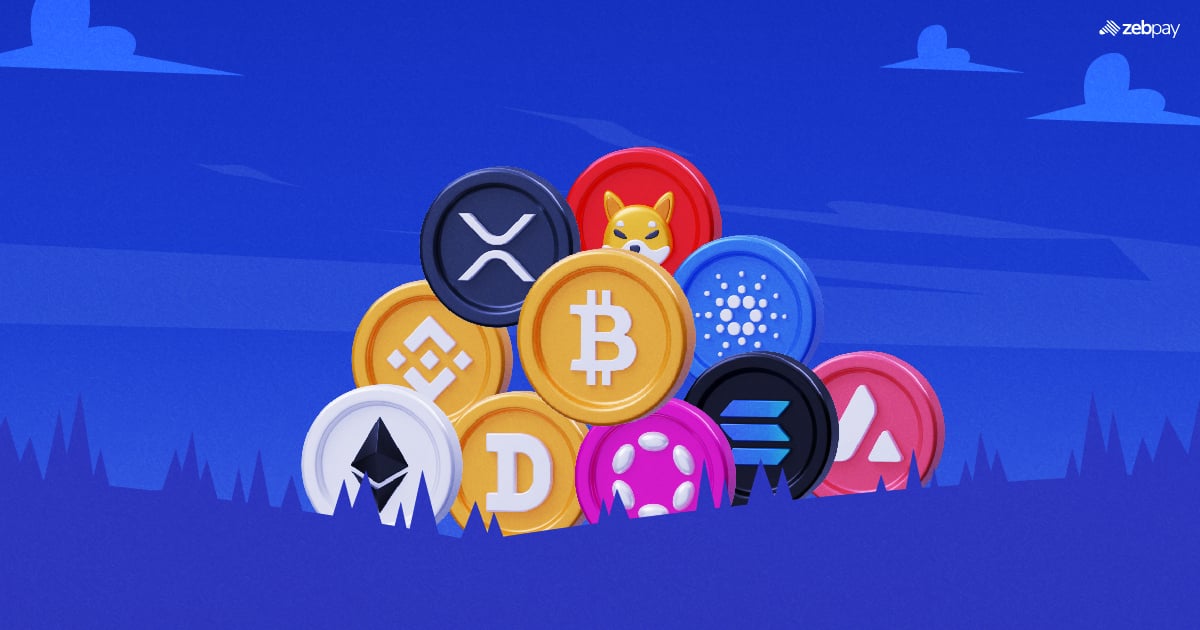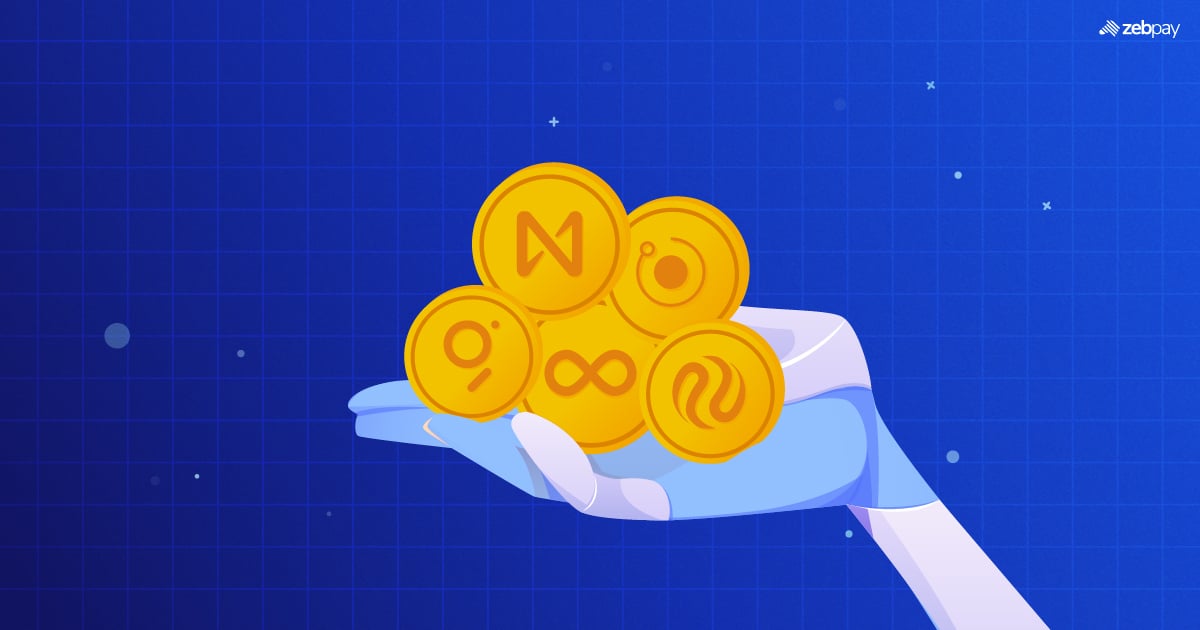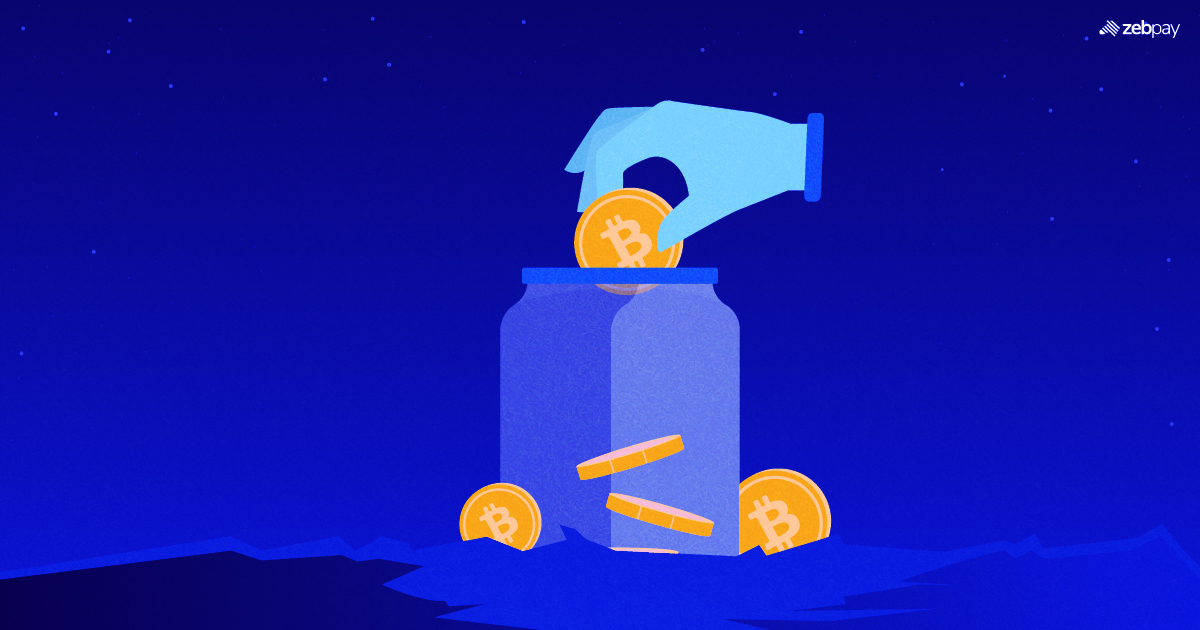Crypto assets are reshaping modern finance, creating new ways for people to access global markets, build long-term value, and engage with systems that extend beyond traditional banking. For those just entering the space, the speed of innovation and unfamiliar terminology can make the first steps feel challenging.
This guide breaks down the key types of crypto assets shaping today’s digital economy, offering a clear and practical starting point before you dive deeper.
In 2026, crypto stands as a maturing and increasingly integrated part of the global financial landscape. Staying informed is essential. Build a strong foundation, define your approach, and move forward in the crypto ecosystem with clarity, confidence, and long-term perspective.
Introduction to Crypto
Crypto tokens have moved far beyond their early use cases and are now integral to how many digital platforms function. They act as the economic layer of decentralized systems, supporting everything from transactions and rewards to governance and access.
Backed by blockchain technology that prioritizes trust and transparency, these tokens are being adopted across gaming, digital ownership, and online communities. Their rise points to a future where digital participation is more interactive, user-driven, and value-oriented—reshaping how people engage, contribute, and create within digital ecosystems.
Also Read: Crypto 2025 Recap: Top 7 Events That Shaped the Year!
Top 10 Crypto Assets
| Coin | Current Price | Market Capitalization | 24-Hour Volume |
| Bitcoin (BTC) | $89,882.09 | $1.79 trillion | $43.07 billion |
| Ethereum (ETH) | $3,092.85 | $373.30 billion | $23.57 billion |
| XRP (XRP) | $2.07 | $125.93 billion | $4.50 billion |
| BNB (BNB) | $883.01 | $121.62 billion | $2.27 billion |
| Solana (SOL) | $133.82 | $75.49 billion | $4.03 billion |
| TRON (TRX) | $0.2958 | $28.01 billion | $686.51 million |
| Dogecoin (DOGE) | $0.1393 | $23.46 billion | $1.66 billion |
| Cardano (ADA) | $0.3885 | $13.96 billion | $651.48 million |
| Chainlink (LINK) | $13.12 | $9.30 billion | $765.12 million |
| Hyperliquid (HYPE) | $25.92 | $8.79 billion | $205.30 million |
Note: This list has been made based on internal research and should not be taken as investment advice. Investors should do their thorough research before buying or selling crypto assets.
Also Read: Is Crypto Legal in India in 2026? Legal Status, Tax Rules, RBI & More
Bitcoin (BTC)
The oldest and most popular crypto token on the market, Bitcoin was the coin that started the entire crypto craze. From its humble beginnings in 2009, it has soared to unimaginable heights and gained the attention of investors, the media and businesses.
The network is used as an alternative means of payment to cash and is protected through Proof of Work consensus. All transactions are stored on a blockchain, while miners can earn rewards for each block of transactions they confirm.
Pros of Bitcoin
- Most well-known token, which leads to heavy investments in the project.
- Relatively stable compared to some newer crypto tokens.
Cons of Bitcoin
- BTC operates on proof of work, which consumes a lot of electricity and requires excessive time to confirm transactions.
- As BTC acts as an index of the general crypto market, it rarely deviates from general market trends and conditions.
Ethereum (ETH)
After Bitcoin, Ethereum has established itself as one of the most dominant forces in the crypto market. It was the first to introduce smart contract functionality, which enables developers to create and automate several key features we take for granted today. Ethereum is also built to provide a platform for decentralised applications and finance, becoming the leading blockchain to service this need.
Pros of Ethereum
- The largest player in the DeFi and dApp space. This gives it market dominance and requires that competitors offer much greater incentives to switch.
- Ethereum’s Proof of Stake consensus mechanism has made the blockchain highly efficient. The future upgrades are focused on increasing TPS and improving the already robust security protocols.
Cons of Ethereum
- Ethereum sometimes has high network traffic that can slow transactions down to a crawl. It must rely on scaling solutions to address the traffic on its network.
- Ethereum’s transaction costs can also skyrocket. In some cases, the fees can be higher than the value of the transaction.
Ripple (XRP)
Unlike other general-purpose tokens, XRP is focused on creating payment solutions for banks and financial institutions. It solves several problems with competing systems like SWIFT for international settlements. Instead of requiring several hours or days for transfers to be finalised, XRP allows such settlements to be completed in a matter of seconds.
Read more: What is Ripple (XRP)
Ripple has made traditional finance much more accessible for users through the efficient application of blockchain technology.
Pros of Ripple
- Much faster than its competitors like SWIFT.
- Expand access to banking and international settlement by lowering barriers to use.
Cons of Ripple
- The network is highly centralised as all transactions are confirmed by a federated group of financial institutions.
- Ripple Labs is engaged in a legal battle with the US Securities and Exchange Commission.
Binance Coin (BNB)
Launched in 2017, BNB has evolved from a simple token to powering its own ecosystem. At first, BNB was used to provide special benefits to users of the Binance crypto exchange, such as lower fees, exclusive access to initial coin offerings and cashback.
Today, it forms the backbone of the BNB Chain ecosystem, which boasts high speed and low cost to compete with Ethereum’s dominance. It has established itself as a strong option in the market.
Pros of BNB
- Low costs and high throughput mean it can service much greater demand than many competitors.
- Owning BNB provides you benefits on the Binance exchange platform
Cons of BNB
- BNB is a highly centralized token, as it is controlled and managed by Binance. This reduces the freedom available to its community.
- BNB’s success is tied to Binance, which the regulators of several countries like the UK, Japan and Germany have targeted.
Solana (SOL)
Solana is a decentralised blockchain platform created for scalability first and foremost. It is one of the fastest blockchains on the market, with a transaction speed of almost 65,000 per second. It accomplishes this through the unique Proof of History consensus mechanism, which allows nodes to synchronise time across the network.
Solana has been one of the fastest-growing projects in the DeFi space and is widely called an “Ethereum-killer”.
Pros of Solana
- Solana is one of the fastest blockchains on the market, making it highly popular among investors.
- The platform also has very low transaction fees, with an average of $0.00025.
Cons of Solana
- Solana is not easily interoperable with Ethereum, thus restricting its smart contracts to those built for the network.
- Solana has experienced several network outages that have made it unreliable for its users.
TRON (TRX)
Tron (TRX) is a blockchain platform designed to decentralize the internet by enabling fast, low-cost transactions and supporting a wide range of decentralized applications (dApps). Its focus on scalability and efficiency has made it a popular choice for developers and users alike.
Pros of Tron
- Tron offers fast, low-cost transactions suitable for high-volume decentralized applications.
- Its expanding ecosystem supports diverse use cases, including DeFi, NFTs, and gaming.
Cons of Tron
- The network faces criticism for being more centralized than other major blockchains.
- Ongoing regulatory scrutiny and leadership controversies may affect its long-term perception.
Dogecoin (DOGE)
Dogecoin is one of the most popular tokens among investors. Initially started as a joke on Bitcoin, it became an internet sensation that garnered a passionate and active community. Its unique value is that it is based on the popular “Doge” meme.
The project has been endorsed by several figures in the crypto community and celebrities like Elon Musk and Vitalik Buterin. It is important to note that Dogecoin is a memecoin and does not have intrinsic value, except for a strong community. Investors should conduct thorough due diligence before deciding to invest in Memecoins.
Pros of Dogecoin
- The unique value proposition of a Memecoin that has sustained its power in the market.
- Active community working for the token’s success.
Cons of Dogecoin
- No practical application, value is only based on a meme.
- There is no cap on the total supply of DOGE, which leads to inflation in the token.
Cardano (ADA)
Cardano is a decentralized blockchain project designed as an open-source platform to support peer-to-peer transactions. Its structured architecture allows for smart contracts, ensuring adaptability and scalability while maintaining robust security measures.
Read more: What is Cardano (ADA)
Pros of Cardano
- Energy Efficiency: Cardano’s Proof-of-Stake (PoS) algorithm is more energy-efficient than Ethereum’s Proof-of-Work (PoW) system, resulting in lower transaction costs and reduced environmental impact.
- Scalability: Designed to handle a high volume of transactions per second, Cardano offers a highly scalable platform for decentralized applications (DApps) and smart contracts.
- Safety and Security: Utilizing the Haskell programming language known for its safety features, Cardano ensures a secure environment for complex smart contracts and DApps, enhancing overall platform security.
Cons of Cardano
- Limited Adoption: Despite its advantages, Cardano is still relatively new and has not achieved widespread adoption compared to platforms like Ethereum, resulting in fewer available DApps and smart contracts.
- Centralization Concerns: While decentralized, critics argue that Cardano may not be entirely decentralized, raising concerns about token distribution and governance within the platform.
Chainlink (LINK)
Chainlink (LINK) is a decentralized oracle network that connects smart contracts with real-world data, enabling reliable and secure automation across blockchain ecosystems. It plays a crucial role in bridging the gap between on-chain and off-chain environments.
Pros of Chainlink
- Provides accurate, tamper-proof data feeds essential for DeFi and smart contract functionality.
- Strong partnerships and integrations across major blockchain projects enhance its utility and adoption.
Cons of Chainlink
- Heavy dependence on DeFi use cases makes it vulnerable to sector-wide downturns.
- Network upgrades and scaling improvements can be slow compared to emerging oracle competitors.
Hyperliquid (HYPE)
Hyperliquid is a next-generation decentralized exchange (DEX) focused on perpetual futures trading, offering deep liquidity, lightning-fast execution, and an intuitive user experience — all without compromising on transparency or decentralization.
Pros of Hyperliquid
- Delivers high-speed, low-latency trading comparable to centralized exchanges.
- Provides advanced perpetual trading features with strong liquidity and cross-margin support.
Cons of Hyperliquid
- Still a relatively new platform, with adoption and security track record yet to be fully established.
- Limited token listings compared to larger exchanges may restrict trading options for users.
Also Read: Matt Hougan Signals Bullish Outlook for Crypto in 2026
Conclusion
The crypto ecosystem continues to grow through a mix of established assets and emerging innovations, each contributing to the market in unique ways. Well-known tokens offer familiarity and a sense of continuity, often serving as a natural starting point for those new to crypto.
At the same time, experienced participants are drawn to newer projects that introduce novel ideas, enhanced capabilities, or practical real-world applications. Together, this blend of maturity and innovation keeps the crypto market adaptive, forward-looking, and constantly evolving.
Just like pineapple on pizza, ZebPay blogs offer a unique twist on crypto insights. Learn more and start your journey with millions on ZebPay!
FAQs
How much should I invest when I start?
It depends on your risk appetite and overall financial situation. As a general guideline, only invest money you’re comfortable losing. Most beginners start with a small, fixed amount and gradually increase their investment as they gain confidence and experience.
What makes Bitcoin still a strong investment in 2026?
Bitcoin remains one of the most trusted crypto assets thanks to its fixed supply of 21 million, increased institutional adoption, and its role as a store of value. Despite its volatility, it continues to be regarded as digital gold.
Which crypto asset should I invest in right now?
Investors often focus on strong, established assets like Bitcoin, Ethereum, BAT, and other reliable high-utility altcoins. The ideal choice ultimately depends on your risk tolerance, time horizon, and overall investment approach—there’s no single coin that suits everyone.
What risks should I consider when investing in altcoins?
Altcoins could come with risks, including:
– High volatility compared to Bitcoin
– Smart contract vulnerabilities
– Regulatory uncertainty across different countries
– Low adoption risk if the project fails to scale
Diversifying across multiple projects can help reduce overall exposure.
How is ROI calculated for crypto assets?
ROI = (Current Value − Initial Investment) ÷ Initial Investment.
If you earn staking rewards or yields, include those amounts in the current value to get a more accurate ROI calculation.
How do crypto prices typically react to macroeconomic events (e.g., inflation, regulation) in 2026?
Crypto markets tend to react sharply to major macro events. Rising inflation or interest rate changes often drive investors toward Bitcoin as a hedge. On the other hand, tougher regulations or new tax policies can lead to short-term market pullbacks.
How can I start investing in crypto?
Begin by learning the basics of blockchain and how crypto assets work. Choose a reliable exchange, start with a small amount, and approach investing with a long-term perspective. Use strategies like rupee-cost averaging (RCA) can help manage risk and smooth out market volatility.
What are the tax implications of buying, holding, and selling crypto assets in India?
In India (2026):
– 30% tax on profits
– 1% TDS on each trade
– No deductions allowed other than the cost of acquisition
Investors should use exchange-generated reports for accurate filing and stay updated with the latest CBDT guidelines.
How to assess whether a crypto project has long-term utility versus just hype?
Look for:
– Real, practical use cases
– Strong and consistent developer activity
– Adoption or integration by businesses
– Clear and transparent tokenomics
– Independent third-party audits
Projects with active ecosystems and genuine adoption generally have a better chance of long-term success.
How can I stay safe and protect my crypto investments from fraud, hacks, or regulatory risk?
Best practices:
– Use hardware wallets or other secure storage options
– Enable 2FA on all exchange accounts
– Avoid suspicious links, messages, and phishing scams
– Trade only on regulated and reputable exchanges like ZebPay
– Stay updated on local regulations and compliance requirements







